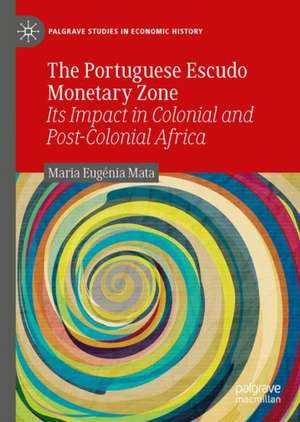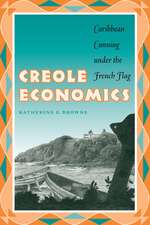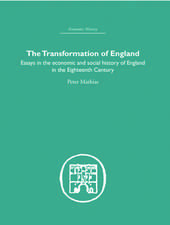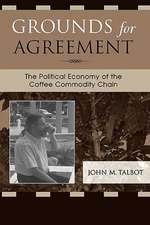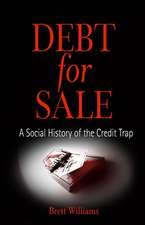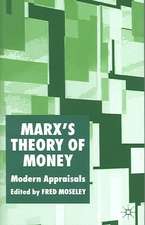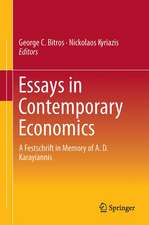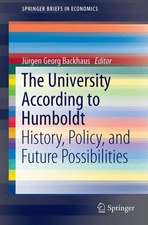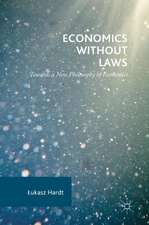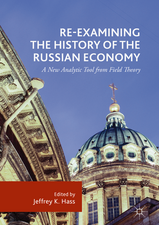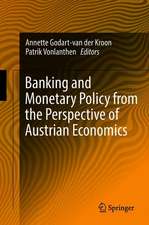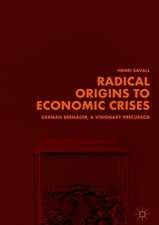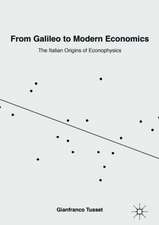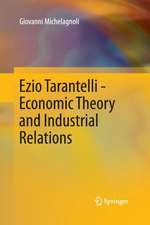The Portuguese Escudo Monetary Zone: Its Impact in Colonial and Post-Colonial Africa: Palgrave Studies in Economic History
Autor Maria Eugénia Mataen Limba Engleză Hardback – 13 iun 2020
This book offers some important lessons regarding the functioning and dismantling of monetary areas, and on the importance of central-banks’ co-operation.
| Toate formatele și edițiile | Preț | Express |
|---|---|---|
| Paperback (1) | 637.78 lei 6-8 săpt. | |
| Springer International Publishing – 13 iun 2021 | 637.78 lei 6-8 săpt. | |
| Hardback (1) | 643.16 lei 6-8 săpt. | |
| Springer International Publishing – 13 iun 2020 | 643.16 lei 6-8 săpt. |
Din seria Palgrave Studies in Economic History
-
 Preț: 497.34 lei
Preț: 497.34 lei -
 Preț: 358.20 lei
Preț: 358.20 lei - 15%
 Preț: 580.36 lei
Preț: 580.36 lei - 20%
 Preț: 939.27 lei
Preț: 939.27 lei -
 Preț: 292.28 lei
Preț: 292.28 lei - 17%
 Preț: 361.80 lei
Preț: 361.80 lei -
 Preț: 357.88 lei
Preț: 357.88 lei - 20%
 Preț: 690.47 lei
Preț: 690.47 lei - 17%
 Preț: 361.38 lei
Preț: 361.38 lei - 18%
 Preț: 945.79 lei
Preț: 945.79 lei - 18%
 Preț: 1012.53 lei
Preț: 1012.53 lei - 15%
 Preț: 700.29 lei
Preț: 700.29 lei - 18%
 Preț: 782.42 lei
Preț: 782.42 lei -
 Preț: 232.82 lei
Preț: 232.82 lei - 15%
 Preț: 644.82 lei
Preț: 644.82 lei -
 Preț: 384.31 lei
Preț: 384.31 lei - 15%
 Preț: 587.85 lei
Preț: 587.85 lei - 18%
 Preț: 899.21 lei
Preț: 899.21 lei - 18%
 Preț: 786.66 lei
Preț: 786.66 lei -
 Preț: 397.97 lei
Preț: 397.97 lei -
 Preț: 388.90 lei
Preț: 388.90 lei - 18%
 Preț: 737.57 lei
Preț: 737.57 lei -
 Preț: 387.20 lei
Preț: 387.20 lei - 15%
 Preț: 647.73 lei
Preț: 647.73 lei - 15%
 Preț: 646.62 lei
Preț: 646.62 lei -
 Preț: 419.06 lei
Preț: 419.06 lei - 15%
 Preț: 459.06 lei
Preț: 459.06 lei - 15%
 Preț: 712.22 lei
Preț: 712.22 lei - 18%
 Preț: 787.47 lei
Preț: 787.47 lei - 18%
 Preț: 1128.57 lei
Preț: 1128.57 lei - 18%
 Preț: 949.55 lei
Preț: 949.55 lei - 15%
 Preț: 471.53 lei
Preț: 471.53 lei - 15%
 Preț: 640.88 lei
Preț: 640.88 lei - 18%
 Preț: 898.26 lei
Preț: 898.26 lei - 18%
 Preț: 1394.21 lei
Preț: 1394.21 lei -
 Preț: 422.90 lei
Preț: 422.90 lei - 18%
 Preț: 955.40 lei
Preț: 955.40 lei - 18%
 Preț: 730.47 lei
Preț: 730.47 lei - 15%
 Preț: 711.56 lei
Preț: 711.56 lei - 18%
 Preț: 783.98 lei
Preț: 783.98 lei - 18%
 Preț: 900.01 lei
Preț: 900.01 lei - 18%
 Preț: 896.08 lei
Preț: 896.08 lei - 15%
 Preț: 705.83 lei
Preț: 705.83 lei - 18%
 Preț: 787.15 lei
Preț: 787.15 lei - 15%
 Preț: 704.69 lei
Preț: 704.69 lei - 18%
 Preț: 1112.48 lei
Preț: 1112.48 lei
Preț: 643.16 lei
Preț vechi: 756.65 lei
-15% Nou
Puncte Express: 965
Preț estimativ în valută:
123.07€ • 128.84$ • 101.83£
123.07€ • 128.84$ • 101.83£
Carte tipărită la comandă
Livrare economică 05-19 aprilie
Preluare comenzi: 021 569.72.76
Specificații
ISBN-13: 9783030338565
ISBN-10: 3030338568
Pagini: 260
Ilustrații: XX, 265 p. 20 illus., 17 illus. in color.
Dimensiuni: 148 x 210 mm
Greutate: 0.49 kg
Ediția:1st ed. 2020
Editura: Springer International Publishing
Colecția Palgrave Macmillan
Seria Palgrave Studies in Economic History
Locul publicării:Cham, Switzerland
ISBN-10: 3030338568
Pagini: 260
Ilustrații: XX, 265 p. 20 illus., 17 illus. in color.
Dimensiuni: 148 x 210 mm
Greutate: 0.49 kg
Ediția:1st ed. 2020
Editura: Springer International Publishing
Colecția Palgrave Macmillan
Seria Palgrave Studies in Economic History
Locul publicării:Cham, Switzerland
Cuprins
Chapter 1: Introduction: Why to Study “The Portuguese Escudo Monetary Zone and its Impact in Colonial and Post-Colonial Africa”.- Part I. The Origin of the Escudo Monetary Zone.- Chapter 2: The Escudo Monetary Zone.- Chapter 3: The Difficulties in launching the Escudo Monetary Zone.- Chapter 4: War, Confidence, and Expectations. Adjusting the Rules of the Escudo Monetary Zone.- Part II. The Transition to a Revised Escudo Monetary Zone.- Chapter 5: The Heritage from the 1963–1968 Period. Marcelo Caetano and the Decision of Asking for Studies.- Chapter 6: The Technical and Political Discussion of the Escudo Zone Problems, and the Reform of 1971.- Chapter 7: The results of the 1971 Reform of Escudo Monetary Zone Union. The Angolan and Moçambican Divergence.- Part III. The End of the Revised Escudo Monetary System.- Chapter 8: Decolonisation and Independence Agreements. Retornados and difficulties of the Banking System.- Chapter 9: The Genesis of theNew Currency Units and Banking Systems in the Portuguese-Speaking African Countries. The Co-operation with Portugal.- Chapter 10: The End of the Escudo Zone Monetary Fund in 1980. The continuation of co-operation.- Part IV. Co-operation from Independences to the End of the Millenium.- Chapter 11: The New Currencies in the West-African Portuguese-Speaking
Countries and the Portuguese Co-operation.- Chapter 12: The Angolan Kwanza and the Portuguese Co-operation.- Chapter 13: The Mozambican Metical and the Portuguese Co-operation.- Chapter 14: Final Remarks: Conclusions.
Countries and the Portuguese Co-operation.- Chapter 12: The Angolan Kwanza and the Portuguese Co-operation.- Chapter 13: The Mozambican Metical and the Portuguese Co-operation.- Chapter 14: Final Remarks: Conclusions.
Notă biografică
Maria Eugénia Mata is Associate Professor at the Faculty of Economics at Nova University Lisbon, Portugal. Her research interests include Economic, Business and Financial History, and the History of Economic Thought. Mata is an Ex-President of the Portuguese Economic and Social History Association.
Textul de pe ultima copertă
This monograph examines the failure of the Portuguese Escudo Monetary Zone and the birth of new monetary and financial systems in Portuguese-speaking African countries. Examining colonial and post-colonial times, Mata analyses the decision to build a Portuguese monetary area in the early 1960s and mid-1970s when the decolonisation process was peaking.
This book offers some important lessons regarding the functioning and dismantling of monetary areas, and on the importance of central-banks’ co-operation.
Caracteristici
Examines the effects of African countries' independence on Portuguese Escudo Monetary Zone Covers the last quarter of the century and the second millennium Reviews the processes of monetary decolonisation of the various territories of the Portuguese colonial empire
